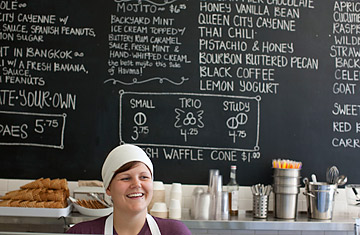
Jeni's Splendid Ice Creams first opened in Columbus, Ohio, in 2002
I remember the first time I had gelato. It was the early '80s. My standard, like everybody else's was Häagen-Dazs, with its dazzling umlauts. Then I had gelato, so creamy, rich and intense, half ice cream and half mousse, and the world became a bigger, better place. I had a similar experience at an ice cream parlor in Columbus, Ohio, the other day. And soon, you're going to have it too, I hope, as its trailblazing owner tries to change the way the artisanal-food game is played.
Jeni's Splendid Ice Creams is not a big business. But it's not a tiny, one-storefront business either. There are seven stores in the Columbus area right now, with two more in the works, including one in Cleveland. And there is a vigorous online business, which I will direct you to right now, before you even read another line. No, go ahead. I'll wait. I recommend the dark chocolate and the Meyer lemon yogurt. Also the coffee, which tastes uncannily like fresh coffee smells, and the wildberry lavender. Or get a couple of the seasonal ones. I'll be here.
It's not like Jeni's is a secret; it's been on the Food Network several times, I'm told, and has a large cult following among Ohio émigrés and ice cream geeks. What distinguishes Jeni's is the success the company is having, given the methods it uses. "We've all been led to believe that there's this ideal of mom-and-pop businesses," says Jeni Britton Bauer, who opened her first store in 2002. "But having been a mom-and-pop business for many years, I can tell you, you can't do it very long. You get burned out; you give bad customer service. But most of all, you can't make ice cream from scratch when you're mom and pop. You have to be pretty big to get a pasteurizer." (Jeni's in-house machine uses a special method of low-temperature pasteurization that makes a huge difference in taste.)
Making ice cream from scratch is a serious undertaking, even for artisanal producers. It's labor-intensive, very expensive and requires a lot of specialized heavy equipment, to say nothing of a major conduit of milk directly from the supplier. (Most ice cream manufacturers, even small-batch ones, just use a premade mix they then add flavors to.) You've heard this story before: tiny company makes wonderful product using method alien to evil corporate rival; tiny company vows to keep at it even if it never makes a dime. There's usually a twee, antiquarian sensibility about it, maybe you grow a handlebar moustache and print a label with an ancient letterpress. Painstakingly (and conspicuously) sourced ingredients, laborious production methods and most importantly a supportive circle of buyers — preferably in somewhere like Brooklyn or Portland, Ore. — completes the picture. There's just one universal law: you can't be expected to make any real money. As a recent article in food-snob bible Edible Brooklyn boasted of its subjects, "none of these entrepreneurs is looking to be the next Mrs. Fields or Ben & Jerry's. Part of what sets this artisan boomlet apart from other start-ups is that the goal is to make a living — not a killing." Real profit, in this narrative, needs be ceded to the corporations.
Except that, as Jeni's is proving, it doesn't. "Growth is good," Britton Bauer says. "The bigger we get, the better our ice cream can be." She doesn't expect to be a national force tomorrow, but there's no hard limit to where she wants to go, which is good. I've written about ice cream before, how the high end seems to grow and get better, and the great broad middle segment hardly seems to have changed since Kirstie Alley was hot. Now that there's an ice cream that's as far above Häagen-Dazs as Häagen-Dazs is above Dolly Madison, can these freezer bricks, with their industrial-grade ingredients, unpronounceable stabilizers and low, low, low price points hold out? Häagen-Dazs invented the premium ice cream category, as it's called in the trade, by cutting the amount of air they cut your ice cream with and giving you all the butterfat you secretly longed for. But its founder, Reuben Mattus, was not an especially avid student of the art and science of dairy. (And his archrivals Ben and Jerry were just two hippies who had taken a correspondence course on ice cream.) Jeni Britton Bauer, on the other hand, has never done anything but work on ice cream, think about ice cream and take ice cream to places where it has never gone. If she can become a success, and it looks like she can, there may yet be hope for all those tiny, perfect products — the micro-distilled spirits, the handmade cheeses, the bean-to-bar chocolates — that currently exist only in gourmet ghettos. After all, there was a time when gelato was unknown in America's supermarkets too.
